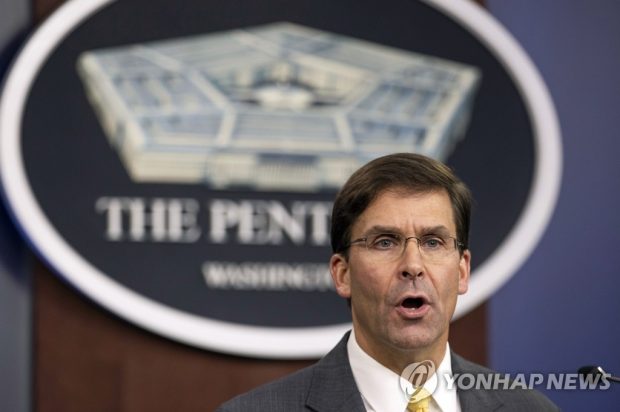U.S. defense secretary open to altering military activity in South Korea

This AP file photo shows U.S. Defense Secretary Mark Esper. (Yonhap)
Washington: U.S. Defense Secretary Mark Esper said that he is open to altering military activity in South Korea if it helps diplomatic efforts to denuclearize North Korea.
Esper made the remark to reporters flying with him to Seoul, where he is due to hold annual defense talks with Defense Minister Jeong Kyeong-doo.
“We will adjust our exercise posture, either more or less, depending on what diplomacy may require,” Esper said, according to a transcript provided by the Pentagon, referring to South Korea-U.S. combined military exercises that North Korea condemns as an invasion rehearsal.
“I think we have to be open to all those things that empower and enable our diplomats to sit down with the North Koreans, alongside with our South Korean partners, and move the ball forward to a negotiated settlement of the issues that we put on the table,” he added.
Esper’s comments come ahead of a planned air exercise between the allies later this month. The drill’s scope has been reduced from the Vigilant Ace exercises that were conducted before U.S.-North Korea diplomacy got under way last year, but the North has still protested in anger.
Earlier Wednesday, a spokesperson for the North’s State Affairs Commission, which is headed by North Korean leader Kim Jong-un, warned of a “greater threat” to the U.S. should the drills go ahead as planned.
Esper said any changes to military exercises would ensure troop readiness on the peninsula and be carried out in consultation with the South Korean government.
“As we consider adjusting, either dialing up or dialing down exercises and training, stuff like that, we want to do that in close collaboration with our (South) Korean partners, not as a concession to North Korea or anything, but again, as a means to keep the door open to diplomacy,” he said.
Denuclearization negotiations between the U.S. and North Korea have made little progress since a second summit between U.S. President Donald Trump and Kim in February ended without a deal.
North Korea has since conducted a series of short-range ballistic missile tests, which Trump has dismissed as no big deal despite concerns the regime continues to improve its capabilities.
“I think anytime you test, you learn something,” Esper said, noting that the North conducted a test around the time he visited South Korea in August. “We take them very seriously and we watch them very closely, but we’re also not going to overreact and do something that, for example, could close the door to diplomacy.”
The secretary added that he takes seriously North Korea’s end-of-year deadline for the U.S. to come up with an acceptable proposal in the negotiations.
He also acknowledged that Washington is seeking a significant increase in Seoul’s contributions to the upkeep of 28,500 American troops in South Korea.
Reports have suggested the U.S. wants its ally to pay US$5 billion next year, a more than five-fold increase from this year.
“I’m not going to speak to the number,” Esper said. “Again, I don’t want to get in front of the State Department on this, but we have asked for a significant increase in the cost-sharing for our deployed troops.”
Meanwhile, the secretary noted that when he took office as Army secretary in 2017, “we were on the path to war” with the North.
“It was very clear to me because the Army was making preparations,” he said without elaborating.
Esper added that in his meetings in Seoul he plans to express Washington’s concern about South Korea’s decision to terminate a military intelligence-sharing pact with Japan on Nov. 23.
“It was the same message I delivered when I was here a couple months ago. And that is the (General Security of Military Information) Agreement must be maintained,” he said. “And it’s critical to sharing intelligence, particularly in a timely manner with regard to any type of North Korean actions.”
The row between Seoul and Tokyo is benefiting only North Korea and China, he said.
YONHAP

























































